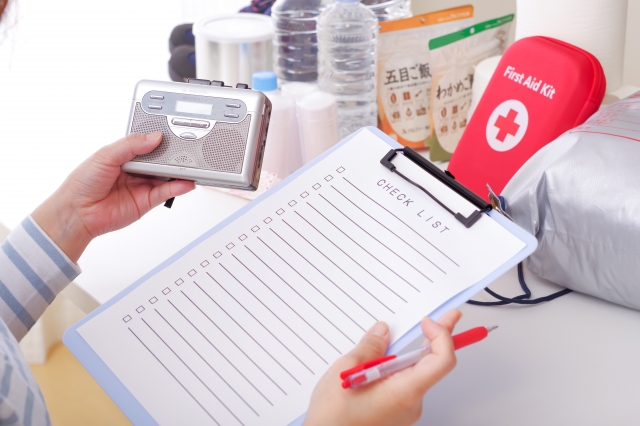Websites to Access During a Disaster in Japan
2023-11-10
Japanese Culture & Customs

Japan is a country that frequently experiences natural disasters such as earthquakes, tsunamis, and typhoons. During times of disaster, getting crucial information is important, especially when secondary disasters like flooding, water supply cut-offs, blackouts, and suspension of public transport occur. However, public announcements in Japan regarding natural disasters are often only provided in Japanese, and it is sometimes hard to find information in other languages.
From an early age, Japanese children are taught in school and at home about the proper actions to take during a disaster. This includes things like where to find information and what things to prepare in advance.
On the other hand, foreign residents and visitors from countries that experience less disasters may not have the same level of awareness regarding disaster preparedness, and they do not necessarily have the opportunity to learn about it after coming to Japan.
Here at the wagaya journal, in order to help foreigners in Japan during such times of disaster, we list down some websites and apps that you can access for disaster information.
Of course, you never know when a disaster will strike. So we recommend that you bookmark these websites or download these apps in advance to have them handy in case of emergencies.
1 Useful Websites and Apps
“Safety tips” Disaster Information App
Produced by the Japan Tourism Agency for foreign tourists and residents, this app lets you receive push-enabled alerts such as early earthquake warnings, tsunami warnings, inclement weather warnings, and evacuation advisories.
Since it is produced by a governmental agency, you can be assured that the information is reliable. It also provides support for multiple languages. If you are a foreign tourist visiting or planning to visit Japan, we highly recommend that you install this app for more peace of mind during your stay.
The app currently supports the following 15 languages:
English, Simplified Chinese, Traditional Chinese, Korean, Japanese, Spanish, Portuguese, Vietnamese, Thai, Indonesian, Tagalog, Nepali, Khmer, Burmese, and Mongolian.
Click here for details and download information
The official website of the Japan Meteorological Agency (JMA) provides various kinds of disaster information, in addition to daily weather forecasts. It is also frequently used by Japanese nationals, and is a useful website to bookmark.
Japan Meteorological Agency Website
VoiceTra
A highly useful app that can translate your speech into 31 different languages. Originally developed for use by foreign tourists to Japan, it is free of charge and has an interface that is very easy to use. The high number of languages it supports makes it one of the best translation apps currently available.
While this app can be convenient for general interactions while sightseeing in Japan, it can also help you communicate with the locals in times of disaster. Make sure to install it and try it out.
2 Websites for Learning about Disaster Preparedness
Earthquake Preparedness Booklet by the Institute of Scientific Approaches to Fire and Disaster
This handy booklet provides useful information and tips about protecting yourself during earthquakes. It is concise and very easy to understand. It is currently available in six languages (Japanese, English, Chinese, Korean, Vietnamese, Portuguese).
“Natural Disasters” Website by the Tokyo Intercultural Portal Site
This easy-to-understand website provides information about various natural disasters as well as evacuation centers and general disaster preparedness. It is available in 8 languages (Japanese, English, Chinese, Korean, Vietnamese, Nepali, Portuguese, Spanish). Besides disaster prevention information, the Tokyo Intercultural Portal Site also provides plenty of useful information for daily life in Japan.
https://tabunka.tokyo-tsunagari.or.jp/disaster/howto.html
Multilingual Disaster Prevention Video by the Sendai Tourism, Convention and International Association
This video provides useful information about preparing for earthquakes and what to do during an actual earthquake. It is available in 12 different languages. The audio-visual format makes the information very easy to understand.
3 Other Concerns
Some foreign residents or visitors to Japan may have dietary restrictions due to medical, religious or other reasons, and they may need to make extra preparations in case of a disaster.
For example, since the emergency food provided in Japanese evacuation centers usually contains meat, wheat, and eggs, people who cannot eat such ingredients may have to prepare their own emergency food.
As for Muslims who need to have a space for prayer, you should keep in mind that prayer rooms and spaces are not very common in Japan, especially in a temporary facility that serves as an evacuation center.
⇒ Click here for a list of emergency supplies you should prepare for disasters
4 Evacuation Centers
During a severe disaster, it is important to know the location of your nearest evacuation center where you can stay to ensure your safety. Below we provide some websites with information about evacuation centers in Tokyo.
List of Evacuation Centers in the Tokyo 23 Special Wards
Summary
In this article, we listed down some websites and apps that foreigners can access to get disaster information or learn about disaster prevention in Japan. We also gave some points that foreigners should keep in mind in case a disaster strikes.
While it is impossible to prepare for all possible scenarios of a disaster, knowing the correct disaster prevention information and making the appropriate preparations can prove to be very useful when an actual disaster occurs.
Even for Japanese nationals who learn about disaster prevention from an early age and frequently see reports of disasters on the news, typical disaster preparedness practices are often not enough to avoid harm completely during an actual disaster.
Disaster preparedness is something that many take for granted even in Japan. But you should always keep in mind that a disaster can strike anytime and anywhere. So now is as good a time as any to start a habit of being prepared for disasters.

